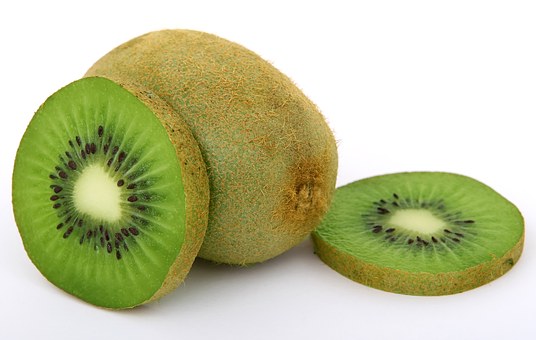
I love kiwi fruit- it’s an unassuming, dull package, but when you cut it open its a brilliant Caribbean surprise!
Surprisingly, although it is most commonly associated with New Zealand, kiwifruit actually originated in the Chang Kiang Valley of China. The Chinese used it as a tonic for children and women after childbirth due to its high nutritional value but never truly enjoyed it as a fruit.
Actinidia chinensis was first exported from Asia in the early 1900s as an ornamental vine, perfect for arbors. It arrived in the United States in 1904 and found its way to New Zealand a couple of years later. Yet it was the New Zealanders who recognized the potential of the succulent fruit, which is botanically a berry and began cultivating it for commercial profit. At the time it was commonly known as the Chinese gooseberry.
A prominent New Zealand exporter, Turners, and Growers adopted the name kiwifruit for the Chinese gooseberry in 1959, in response to anti-communist sentiments and the thinking that consumers might be offended by the existing moniker. A tiny fruit with such a big history!
Why should you eat this yummy little fruit? Worlds Healthiest Foods reports this:
Health Benefits
Kiwifruit can offer a great deal more than an exotic tropical flair in your fruit salad. These emerald delights contain numerous phytonutrients as well as well known vitamins and minerals that promote your health. In the world of phytonutrient research, kiwifruit has fascinated researchers for its ability to protect DNA in the nucleus of human cells from oxygen-related damage. Researchers are not yet certain which compounds in kiwi give it this protective antioxidant capacity, but they are sure that this healing property is not limited to those nutrients most commonly associated with kiwifruit, including its vitamin C or beta-carotene content. Since kiwi contains a variety of flavonoids and carotenoids that have demonstrated antioxidant activity, these phytonutrients in kiwi may be responsible for this DNA protection. The protective properties of kiwi have been demonstrated in a study with 6- and 7-year-old children in northern and central Italy. The more kiwi or citrus fruit these children consumed, the less likely they were to have respiratory-related health problems including wheezing, shortness of breath, or night coughing. These same antioxidant protective properties may have been involved in providing protection for these children.
Kiwifruit Offers Premier Antioxidant Protection
Kiwifruit emerged from our food ranking system as an excellent source of vitamin C. This nutrient is the primary water-soluble antioxidant in the body, neutralizing free radicals that can cause damage to cells and lead to problems such as inflammation and cancer. In fact, adequate intake of vitamin C has been shown to be helpful in reducing the severity of conditions like osteoarthritis, rheumatoid arthritis, and asthma, and for preventing conditions such as colon cancer, atherosclerosis, and diabetic heart disease. And since vitamin C is necessary for the healthy function of the immune system, it may be useful for preventing recurrent ear infections in people who suffer from them. Owing to the multitude of vitamin C’s health benefits, it is not surprising that research has shown that consumption of vegetables and fruits high in this nutrient is associated with a reduced risk of death from all causes including heart disease, stroke and cancer.
Fiber—Concentrated in Kiwifruit—for Blood Sugar Control Plus Cardiovascular and Colon Health
Our food ranking system also qualified kiwifruit as a very good source of dietary fiber. The fiber in kiwifruit has also been shown to be useful for a number of conditions. Researchers have found that diets that contain plenty of fiber can reduce high cholesterol levels, which may reduce the risk of heart disease and heart attack. Fiber is also good for binding and removing toxins from the colon, which is helpful for preventing colon cancer. In addition, fiber-rich foods, like kiwifruit, are good for keeping the blood sugar levels of diabetic patients under control. Kiwi fruit also passed our food ranking test as a good source of the mineral potassium.
Kiwifruit’s Potential Protection against Macular Degeneration
Your mother may have told you carrots would keep your eyes bright as a child, but as an adult, it looks like fruit is even more important for keeping your sight. Data reported in a study published in the Archives of Ophthalmology indicates that eating 3 or more servings of fruit per day may lower your risk of age-related macular degeneration (ARMD), the primary cause of vision loss in older adults, by 36%, compared to persons who consume less than 1.5 servings of fruit daily.
Kiwifruit is a Delicious Way to Enjoy Cardiovascular Health
Enjoying just a couple of kiwifruit each day may significantly lower your risk for blood clots and reduce the amount of fats (triglycerides) in your blood, therefore helping to protect cardiovascular health. Unlike aspirin, which also helps to reduce blood clotting but has side effects such as inflammation and bleeding in the intestinal tract, the effects of regular kiwi consumption are all beneficial. Kiwifruit is an excellent source of vitamin C, and polyphenols, and a good source of potassium, all of which may function individually or in concert to protect the blood vessels and heart. In one study, human volunteers who ate 2 to 3 kiwifruit per day for 28 days reduced their platelet aggregation response (potential for blood clot formation) by 18% compared to controls eating no kiwi. In addition, kiwi eaters’ triglycerides (blood fats) dropped by 15% compared to controls.
Something to note- the skin of the kiwi is a nutritional powerhouse. try eating it- its different but not bad!
Happy Healthy Eating! Dana
http://www.whfoods.com/genpage.php?dbid=41&tname=foodspice
https://www.thespruce.com/kiwi-fruit-history-1807620









